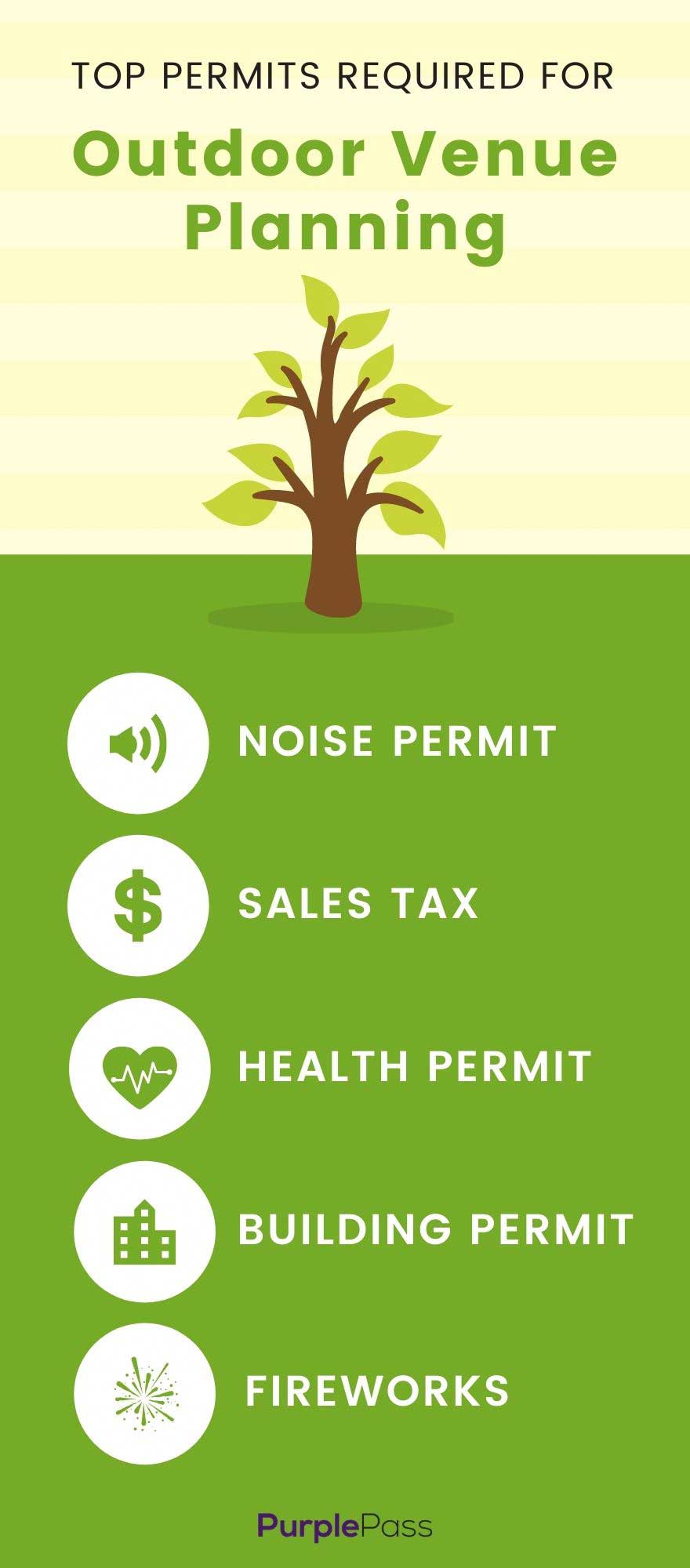Top Permits Required for Outdoor Venue Planning
Planning an event is quite a detailed process. The last thing any organizer wants is an untimely cancellation by authorities due to licensing issues.
But for outdoor events, you wouldn’t want all that hard work, which took you several days, or sometimes months flushed down the drain because of some misdemeanors that you could have otherwise avoided. That’s why it’s important to acquaint yourself with the permits you need to hold various types of events.
Permits you need for outdoor venues in the U.S
We compiled the following list of the top seven permits every outdoor event organizer in the U.S. should know about and have for an outdoor venue.
1. Noise permit (music)
If you’re planning to have music at your event, this is one of the most critical permits to acquire.
It’s based on the Noise Control Act of 1972 and the Quite Communities Act of 1978, both of which seek to preserve human health and minimize noise disturbance to the public. The Acts were initiatives of the federal government which cut funding to the noise control program in 1981. Since then, state and local governments have taken over implementing these Acts, establishing state-based noise ordinances and processing noise permits.
Reasons why you need a noise permit:
- To protect yourself against sound complaints
- For concerts, music, bands, etc.
- A noise permit stipulates the amount of noise you’re allowed to have at the event and for how long.
-
It may also highlight allowable noise sources
To acquire a noise license, consult with your local environmental protection authority.
2. Building permit
Also known as Construction Permit in other countries, it allows you to do:
-
Install prefabricated structures like classrooms on the stipulated location
-
Erect temporary structures such as tents, platforms, and bleachers for an event
-
Temporarily use existing properties or buildings for purposes other than they’re ordinarily used for
-
Use an existing building to hold an event for several people
These are just a few provisions that cut across multiple states; the list goes on and on. Building permits seek to safeguard the safety of the attendees and the public.
In most states, you’ll acquire construction permits from fire departments.
3. Seller’s permit (sales tax)
Also known as the sales tax permit, this is one of the most overlooked licenses. It allows event organizers to collect and remit taxes in the venue states.
When you sell tickets or merchandise in your event, the local authorities tax the audience for their purchases. Because it’s way easier to go after the event organizers than each buyer, you will indirectly collect the tax on behalf of the local government.
A sales tax permit grants you the ability to discharge this mandate.
The same applies to the vendors at your event. Initially, this tax was only levied on businesses with a physical presence/nexus (office, warehouse, store, etc.) in the hosting state. However, a recent court ruling in South Dakota v. Wayfair, Inc. directed that nexus can also be based on economic activity. In short, any organization running a money-generating venture must acquire a seller’s permit.
Up to 43 states have since adopted the economic nexus criteria.
Because this is a tax-related license, you can typically apply for it at the hosting state’s tax authority website. The requirements vary from one state to another. Some like Maryland will allow you to acquire the permits on necessity, while others like California will require you to get the license regularly. Ensure that all the vendors in the event also have the seller’s permit.
4. Health permit (food)
Are you planning to sell or serve food and drinks at your event?
If yes, then you need to get a license from the local health department. They will ask you how you intend to serve the food without jeopardizing the attendees’ health. In most cases, the health department will dispatch a team to the outdoor venue to confirm its safety before granting the license.
Requirements vary from one state or county to another.
To increase your chances of approval, you can ask the department for a self-inspection checklist to ensure everything is okay before their visit. For outdoor events, make sure that there are enough washrooms, handwashing booths, and proper signage.
5. Fire/Fireworks permit
It’s not uncommon to crown outdoor events with fireworks displays.
Well, before you light up the sky with those colorful blasts, ensure that they are legal in that locality. Some counties like Los Angeles and San Diego have outlawed fireworks, and violations may attract fines as hefty as $10,000.
If fireworks are legal wherever you want to host the event, get the requisite fireworks permits. The granting or revocation of such licenses is premised on the Federal explosive regulations implemented by the Bureau of Alcohol, Tobacco, Firearms, and Explosives (ATF). Once ATF has approved your application, they will assign your event to a trained pyrotechnician to supervise and ensure that all safety protocols are observed.
Some state and county governments also have fireworks regulations for their specific jurisdictions; you can find details from respective fire departments.
6. Business license
Events are economic undertakings.
And so, as is with every other business, you need to acquire a business license to run an event. Such permits ensure fair play, safeguard clients, and ensure that all operations are transparent. Typically, you can get a business license from the local trade department.
7. Event permit
We should have probably started with this one—it is the mother of all the other licenses. As the name suggests, this permit allows you to hold an event in a particular location.
|
Request your venue seating map We build an unlimited amount of maps for |







